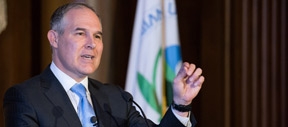Government for the people is absent when you cannot have a public conversation with the people you represent and work for:

Tom Borden, director of the estuary program, said that Wayne Munns, director of the Atlantic ecology division of the EPA’s Environmental Effects Research Laboratory, called him to deliver the news, but did not give an explanation.
“I’ve not received any clarity as to why it happened,” Borden said in an interview Sunday afternoon.
When asked for an explanation, the agency said the following in an emailed statement: “EPA supports the Narragansett Bay Estuary, and just this month provided the program a $600,000 grant. EPA scientists are attending, they simply are not presenting; it is not an EPA conference.”
The cancellation was first reported by The New York Times. John King, chair of the estuary program’s science advisory committee, told the Times that he believed the scientists were being blocked from speaking because much of the workshop will be focused on climate change.
Scott Pruitt, the EPA administrator, and other members of the Trump administration have denied the role of carbon emissions in climate change
In an interview Monday morning, hours before the workshop was set to begin, King, a professor of oceanography at the University of Rhode Island, said that nothing he had heard over the weekend had convinced him that there was another reason behind the cancellation.
“They have not provided any explanation,” he said. “But what else could it be about?”
He said the cancellation undermines the scientific process.
“Pruitt has said on record that he wants to see more peer review of reports,” King said. “The key to that is having scientists getting together and talking.”
He continued, “As soon as you start trying to censor science, how do you keep it out of the realm of the political? This looks like the opening volley of the war on science.”
King and Borden both said that their understanding is that the EPA scientists will attend the workshop, but they will not present.
They will not be at an earlier news conference to officially release the report, according to what Borden and King were told, but none of them were scheduled to speak at that event. Rhode Island’s congressional delegation, which includes Sen. Sheldon Whitehouse, a vocal critic of Pruitt, will participate in the news conference.
Besides Oczkowski, the other EPA scientists who were affected by the decision are Rose Martin, a postdoctoral fellow at the Narragansett lab, and Emily Shumchenia, a consultant with the EPA and a former student at URI under King.
Shumchenia, who wrote a chapter on the Bay’s seafloor, was the only one of the three to contribute extensive work to the report, Borden said. Five other EPA scientists also contributed.
Borden emphasized that the estuary program has a very good relationship with the Narragansett lab, and in general with the EPA, which contributes funding to the program.
He also made clear that the report looks at a variety of factors influencing the health of Narragansett Bay.
“The changing conditions were certainly discussed throughout the report, but by no means was it only a climate change report,” he said.
King said he’s unsure whether anyone from the EPA will feel comfortable attending the workshop.
“It’s a little bit chilling,” he said.

No comments:
Post a Comment